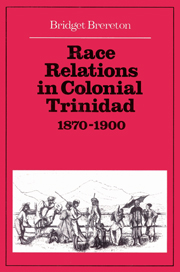Book contents
- Frontmatter
- Contents
- Acknowledgements
- Glossary
- 1 Introduction
- 2 The environment
- 3 The white elite
- 4 Education and mobility
- 5 The rise of a coloured and black middle class
- 6 The urban labouring population
- 7 The black rural masses
- 8 The souls of black folk
- 9 The Indians
- 10 Racism and race relations: the divided society
- Abbreviations
- Notes
- Bibliography
- Index
8 - The souls of black folk
Published online by Cambridge University Press: 08 October 2009
- Frontmatter
- Contents
- Acknowledgements
- Glossary
- 1 Introduction
- 2 The environment
- 3 The white elite
- 4 Education and mobility
- 5 The rise of a coloured and black middle class
- 6 The urban labouring population
- 7 The black rural masses
- 8 The souls of black folk
- 9 The Indians
- 10 Racism and race relations: the divided society
- Abbreviations
- Notes
- Bibliography
- Index
Summary
We have accepted, in this study, the concept of a dominant culture, coexisting with a ‘sub-culture’, a despised and partly submerged culture formed by, and belonging to, the Creole masses. The dominant culture was essentially British and Christian. The law, the orthodox churches, the schools, the English language, the government, British values and traditions, made up the dominant culture. Very few working-class Creoles could escape entirely the influence of these institutions; only, perhaps, those living in the deep forest. The black masses combined, in their cultural world and life-style, elements of the superstructure with their own values.
Law and custom, the African drum and the fiddle, the country doctor and the bush healer, the Catholic liturgy and the cults of Yorubaland and Dahomey, school English and Patois, lived side by side … and a dual acculturation process took its course – creolisation, and accommodation to the institutions and standards of the super-structure.
Many elements combined to form the cultural world of the black masses. The nuclear group consisted of the Creole ex-slaves and their descendants. They had lived in Trinidad during the longest period, and had developed a more or less common set of cultural characteristics, which combined to form the mainstream of the culture pattern of Trinidad. They were the majority group in the black folk. They were joined by immigrants from the eastern Caribbean, themselves ex-slaves, and their descendants, and by liberated Africans from many different West African tribes. The peons from Venezuela brought Spanish elements to reinforce those contributed by the original Spanish settlers and their descendants, and by the Hispanised Amerindians. French influence had been important ever since the beginning of French immigration in the 1780s.
- Type
- Chapter
- Information
- Race Relations in Colonial Trinidad 1870–1900 , pp. 152 - 175Publisher: Cambridge University PressPrint publication year: 1980



